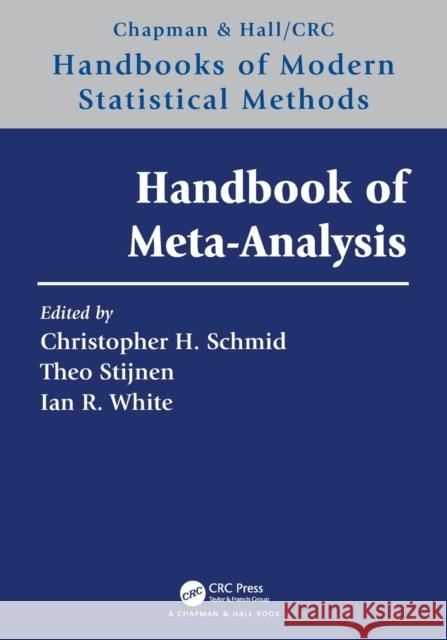Handbook of Meta-Analysis » książka



Handbook of Meta-Analysis
ISBN-13: 9780367539689 / Angielski / Miękka / 2022 / 554 str.
Handbook of Meta-Analysis
ISBN-13: 9780367539689 / Angielski / Miękka / 2022 / 554 str.
(netto: 317,14 VAT: 5%)
Najniższa cena z 30 dni: 308,94
ok. 22 dni roboczych.
Darmowa dostawa!
Meta-analysis is the application of statistics to combine results from multiple studies and draw appropriate inferences. Its use and importance have exploded over the years as the need for a robust evidence base has become clear in many scientific areas like medicine and health, social sciences, education, psychology, ecology and economics.
Wydanie ilustrowane
"Handbook of Meta-Analysis is a most laudable and detailed treatise on meta-analysis. It successfully covers - with gusto and substance - the full range of statistical methodology used in meta-analysis in a statistically rigorous and up-to-date manner, exuding a good balance of theory and applications (with real data and software syntax provided). It provides a comprehensive, coherent, and unified overview of the statistical foundations behind meta-analysis. Crafted by experts on the topic, each chapter is written with lucidity and surgical precision. It is elegantly organized, encyclopedic in breadth and depth, and fluent in exposition on the multidimensional role of meta-analysis: core material (background, systematic review process, data extraction, study-level results, frequent and Bayesian approaches); key extensions (meta-regression, individual data, multivariate meta-analysis, network meta-analysis, model checking, bias); and advances in particular fields of biomedical and social research (control risk regression, survival data, correlation matrices, genetic data, dose-response relationships, diagnostic tests, surrogate endpoints, complex observational data, prognostic models). It is a tour de force, a premier, and an indispensable reference that is highly recommended - and a must for serious researchers and practitioners engaged in meta-analysis. This state-of-the-science handbook is destined to be a classic."
- Joseph C. Cappelleri, PhD, MPH, MS, Executive Director of Biostatistics, Pfizer Inc
"For many researchers in social, medical, life and environmental sciences, it has become an essential part of their activities to synthesize evidence from the body of relevant research. The Handbook of Meta-analysis provides the most comprehensive and up-to-date coverage of the quantitative part of evidence synthesis, i.e., meta-analysis. Therefore, this handbook is a must-have for all researchers who wish to unlock and understand the power and potential of meta-analysis, but also for those who have already found and benefited from it. The authors of this edited volume are an interdisciplinary all-star team of statisticians and methodologists; probably, each of them could have written a textbook on meta-analysis. Here, they introduce both basics and advanced techniques that they have been leading to develop over their career. For many statisticians, a meta-analysis may be just one type of linear models (Chapters 1-11), yet, as this book demonstrates, meta-analyses can come in diverse forms and serve different purposes (see Chapters 14-22). Further, there are specific statistical issues meta-analysis needs to grapple with, such as publication bias (Chapters 12-13). The book ends with a chapter on how to use meta-analysis to plan our future work (Chapter 23) - what all scientists should be doing to reduce research waste and to accelerate scientific progress."
- Shinichi Nakagawa, Professor of Evolutionary Biology and Synthesis, University of New South Wales, Sydney, Australia
"This is an important book on an important subject, covering both theory and application, and it should be valuable to a wide range of readers in statistics and applied fields."
- Andrew Gelman, Columbia University
- Thomas Bradstreet, Appeared in the Journal of Biopharmaceutical Statistics
1. Introduction to systematic review and meta-analysis
2. General themes in meta-analysis
3. Choice of effect measure and issues in extracting outcome data
4. Analysis of univariate study-level summary data using normal models
5. Exact likelihood methods for group-based summaries
6. Bayesian methods for meta-analysis
7. Meta-regression
8. Individual participant data meta-analysis
9. Multivariate meta-analysis
10. Network meta-analysis
11. Model Checking in meta-analysis
12. Handling internal and external biases: quality and relevance of studies
13. Publication and outcome reporting bias
14. Control risk regression
15. Multivariate meta-analysis of survival proportions
16. Meta-analysis of correlations, correlation matrices and their functions
17. The meta-analysis of genetic studies
18. Meta-analysis of dose-response relationships
19. Meta-analysis of diagnostic tests
20. Meta-analytic approach to evaluation of surrogate endpoints
21. Meta-analysis of epidemiological data, with a focus on individual participant data
22. Meta-analysis of prediction models
23. Using meta-analysis to plan further research
1997-2026 DolnySlask.com Agencja Internetowa
KrainaKsiazek.PL - Księgarnia Internetowa









